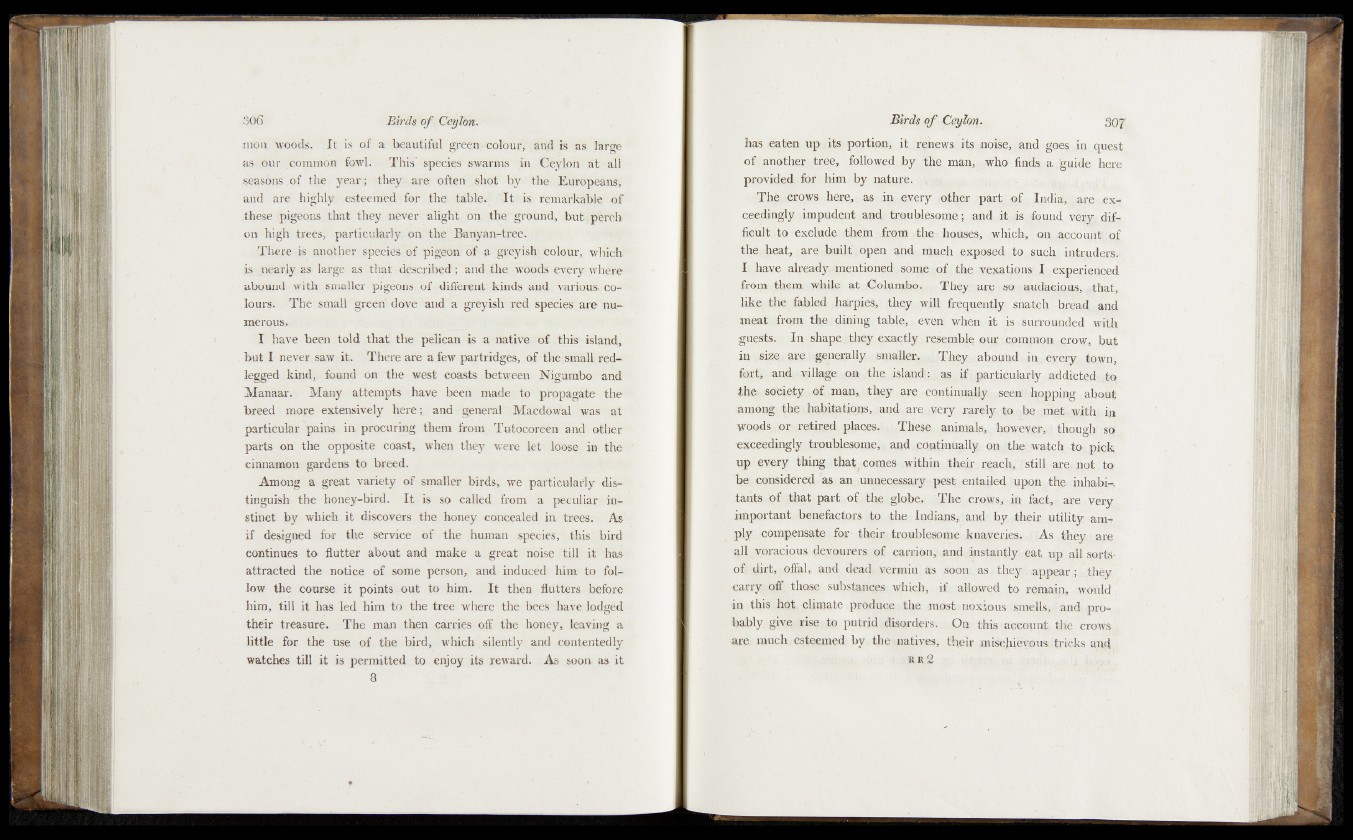
B i r d s ~ ó f i\.C ë y T o f t.
mon woods. I t is of a beautiful gteen^colburj and is as^Tfctge
as our common fowl. This* species swarms in vIS’éjflpn at all
ssè#shfls year} 4heyK-«pei. often shot
and are' highly’ esteemed for the table« I t is remarkable of
these il^geoBs- th&t they never alightbon the ground, but, perch
on high tyees, particularly on the Banyan-treè..
There 4s another . Species of pigeon: of a greyish colour,- which
is .nearly,às large as that described ; and the woods eveiy where?
abound with smaller pigeons tof different' kinds and various, co*-'
lours. . The small green dove and a greyish red species, are numerous.
I have-been told that the pelican is a native of this island*
but I never saw it. Them are a few partridges, of the smalL red-
legged kind, found on the-west coasts between ^igi^aafeo and
Manaar. Many attempts have been made to'propagate^ thé-
breed more extensively here;. and general- Maedowal was at
particular pains in procuring them from. Tutdeorebn an# ©thér
parts on the opposite coast, when they were fot loose in thé
cinnamon gardens to breed.
Among a great variety of smaller birds, we particularly distinguish
the honey-bird. I t is so called te rn a peculiar instinct
by which it discovers the honey concealed in trees. As
if designed for the service of the human species, ' this bird
continues to flutter about and make à great noise till it has
attracted thé notice of some person, and induced him to follow
the course it points out to him. I t then flutters before
him, till it has led him to the tree where the bees have lodged
their treasure. The man then carries off the honey, leaving a
little for the Use of the bird, which silently and contentedly
watches till it is permitted to enjoy its reward. As soon, as it
has eaten up its portion,
’ofi|^notberfa^pe^'|^%^e^by ithe m^n^oW-ho finds, -a.guide here
provided for* him: by n a te s . ^
i-iThfe.!crows':'bere^a® in every other pgrt, o f, Jb d ^ # a re * exceedingly
impudent and t^ubfoaome,;, andtrtvis founds v ^yj dijn
.from the i houses, which,, o ife ^ o u q t^ o i
the heat, are built,] open and much ,e.xp^se,d-it9^chf ii# jp d e r^
I . have alreadyffpen tioned^oigp, cf£. th e , ^e^tjonji}, I isSPCd
from them while a t a£ofombo. * ^Theydure i:s© ^ u d a ^ i « ,
likfe ;41n^.6W41- ,J«6rpies, they will %qjuently snatch brteaft -.and
meat fr^ n thhl#^ug-table,*> w e f t wha* At -js^u^ou^fod with
guests. In shapeJothey exactly. resemble o u t; cpmtnon, c|ow, but
misip « arCygoperully smaller, They ab0juqds<inyd^ognytown,
folk and-idltoge-pn the island: as if jparticularly addiete.dntq
the, society ,of,jj man«, th ey are continually ^seeaf \jmgpiflg t ab.©M
umoag the^hahifo%ns, and; $pfo$fery rarely to,qbernmtff wifehf in
Wbodsfipr ;reMr## .^ninmlg,,, 1Wees*,-fL^g^|j|sa
exceedingly. troublesome,; andcd^tinually, ©n,ithei iwntch;, 1%,. pjch
up e y ^ ihihg tha^ copes ,withip ,th ^ ..ja a d > j ||^ L«atet.not „fct
b e considered as an unnecessary. pestjjj entailed upon-.thpi;inhabit
tants of that part o f, the globe, The, crows,, in fect,>; a^e«,very
important, benefoctors ,to the I l i a n s , ;and by their- utifftp. amt
' ply compensate ....for- thpiti tr^blessttte kn^eiie^ij .jA s they are
^l%J^^fiftus>def^nfierii.:0f carrion, and instantly,,eat up sorts-
- o i l a n d ^ doad«Jgefa»ih sis h©on, as. itfepfappear ; ;they
carrjl off; th$§e subst&mjp which, allows# to remains <w&fld '
in this hot climate producex&he meet ^<8-iprew
bably. givdfipse.to putrid disorders. u 0 a tMs^aQCopnst thte crows ,
are much esteemed by the natives, tiseir }mischib#imitricks and